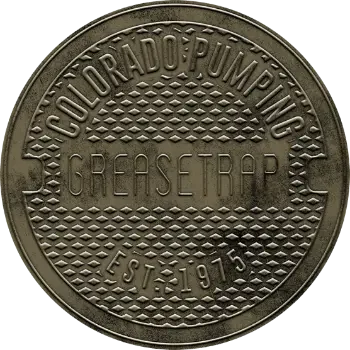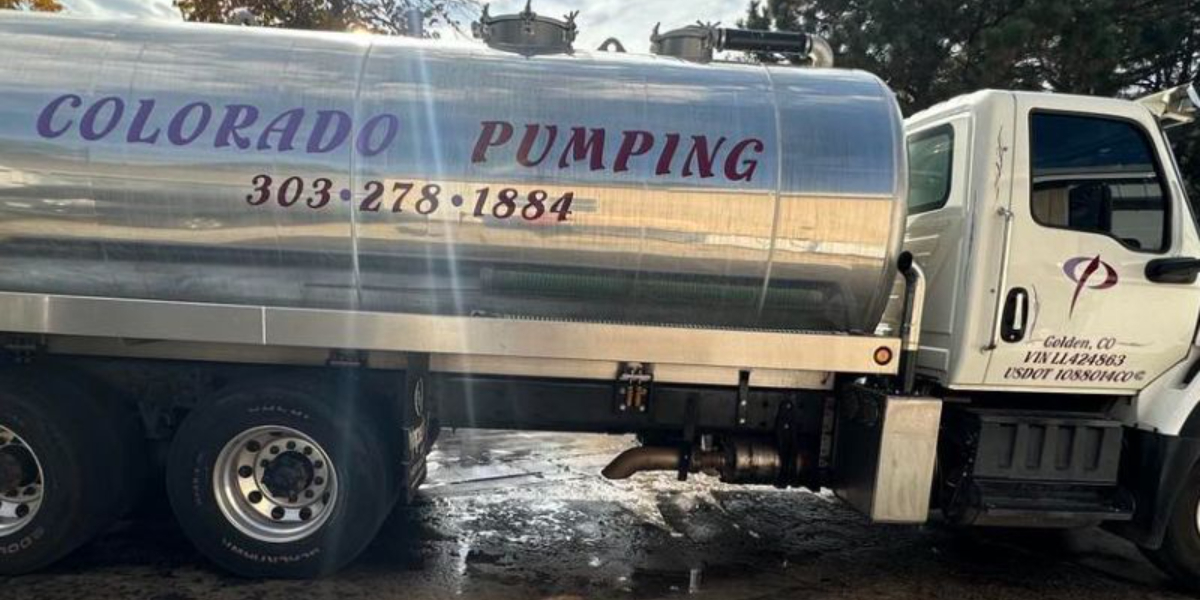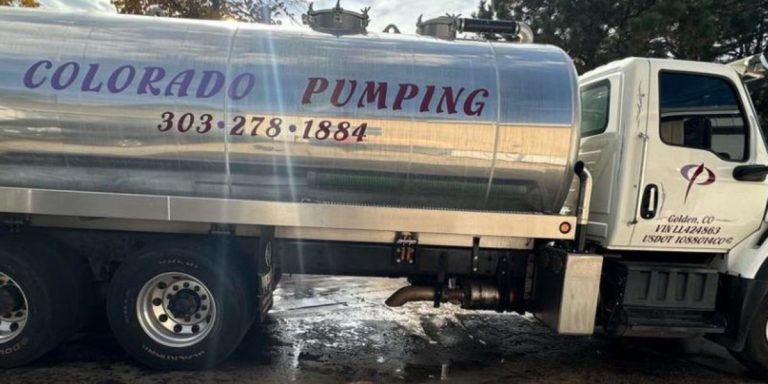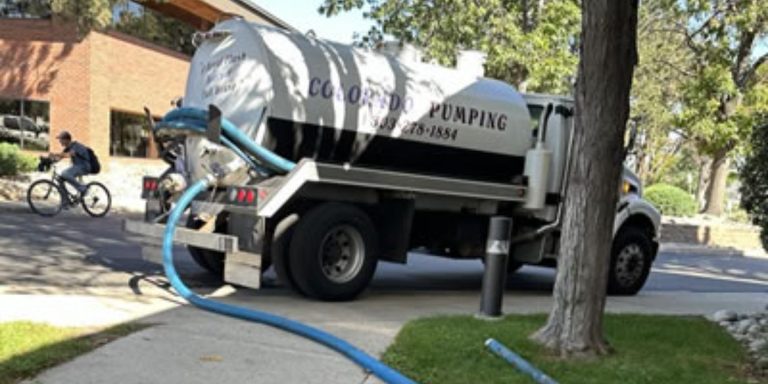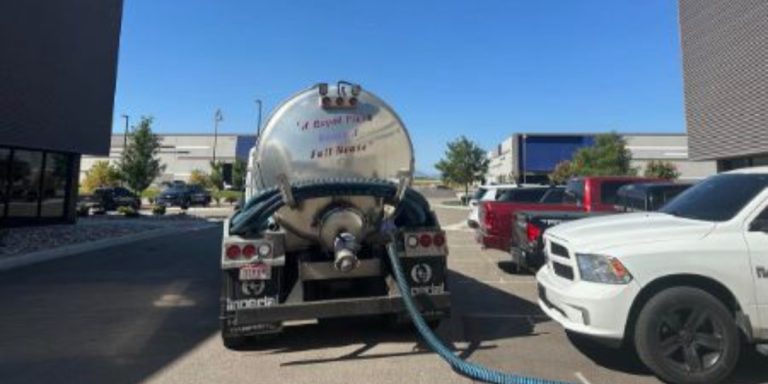How Often do Grease Traps Need to be Pumped
Grease traps are a critical part of every commercial kitchen, yet they’re often forgotten until a problem arises. When they fill up, you may notice slow drains, unpleasant odors, or even surprise visits from the health department. Preventing these issues starts with one simple habit, regular grease trap pumping.
At Colorado Pumping, we’ve been helping Denver-area restaurants, schools, hotels, and commercial kitchens maintain clean, efficient grease traps since 1978. As a licensed and insured septic and grease trap pumping company, we know exactly how often traps should be serviced and what happens when they aren’t. This guide will help you understand your system, identify signs of trouble, and schedule maintenance that keeps your operation running smoothly.
What a grease trap does
Every sink or dishwasher in a commercial kitchen sends wastewater filled with fats, oils, and grease (known as FOG) into the plumbing system. A grease trap captures this material before it reaches the municipal sewer or your septic system.
Inside the trap, lighter FOG floats to the top while solids settle at the bottom. The cleaner water layer in the middle exits into your drain line. Over time, however, the trapped material accumulates until there’s no space left for separation. That’s when you need professional pumping.
Without routine cleaning, FOG can overflow into your plumbing and cause blockages, odors, and costly repairs. In the Denver Metro area, local regulations often require scheduled pumping to prevent sewer backups and environmental contamination.
How often should grease traps be pumped?
The general rule of thumb is that a grease trap should be pumped every one to three months. But frequency depends on several factors unique to your facility:
-
- Trap size – Smaller traps fill up faster and require more frequent pumping.
- Volume of food production – High-traffic kitchens that fry or cook with oils need monthly service.
- Type of food served – Greasy or fried foods generate more FOG than salad bars or bakeries.
- Local regulations – Denver and surrounding municipalities often have specific inspection or pumping requirements.
- System performance – If drains are slow or odors appear, your trap likely needs attention sooner.
The 25 percent rule
A common industry standard known as the 25 percent rule helps determine when it’s time to pump. When the combined grease and solids in your trap reach 25 percent of its total liquid depth, the system is no longer effective. At that point, grease and solids start escaping into your plumbing.
Colorado Pumping’s technicians measure and document this level during every service visit. If your trap is reaching 25 percent faster than expected, we’ll recommend a more frequent maintenance schedule tailored to your operation.
Signs your grease trap needs service now
Even with a regular schedule, it’s important to watch for warning signs that indicate your trap is full:
-
- Water drains slowly from sinks or dishwashers
- A strong rancid or sour smell comes from the trap or floor drains
- Visible grease or residue appears around sink drains
- You notice gurgling sounds or bubbling in the plumbing lines
- Health inspectors cite FOG violations or recommend cleaning
If you experience any of these symptoms, schedule a service visit immediately. Ignoring them can lead to costly downtime or emergency plumbing calls.
What happens during professional grease trap pumping
Proper grease trap cleaning involves more than simply removing the top layer of grease. At Colorado Pumping, our process ensures your system is completely cleaned, inspected, and ready for use:
-
- System inspection – We locate and open the trap, noting access conditions and any structural concerns.
- Measurement and documentation – The contents are measured for volume and thickness to verify compliance.
- Vacuum removal – Our 3,500-gallon vacuum truck removes all grease, solids, and wastewater.
- Wall scraping and cleaning – Technicians hand-scrape the interior to remove hardened buildup.
- Component check – Baffles, gaskets, and inlet/outlet pipes are checked for damage or corrosion.
- Disposal and reporting – Waste is transported to an approved facility for proper treatment, and service records are provided for your compliance file.
This detailed approach meets or exceeds environmental regulations and prevents future issues with your plumbing or local inspectors.
What can happen if you delay grease trap pumping
Many business owners underestimate how quickly grease builds up. Skipping even one scheduled service can create expensive and unpleasant consequences:
-
- Plumbing blockages – Hardened grease clogs drain lines, leading to backups and overflow.
- Odor complaints – Decomposing grease releases strong odors that drive away customers and staff.
- Health violations – Denver and nearby counties enforce strict FOG disposal standards; non-compliance can result in fines or shutdowns.
- Environmental damage – Overflowing grease can enter storm drains or septic fields, contaminating soil and water.
- Higher long-term costs – Emergency pump-outs or line jetting cost significantly more than scheduled maintenance.
Consistent cleaning is always less expensive than repair or penalty fees.
How to determine the right schedule for your business
While one to three months is the average, the ideal frequency depends on your operations. Here’s how we typically tailor service plans:
-
- Small cafés or coffee shops: every 2–3 months
- Casual dining restaurants: every 1–2 months
- Large or high-volume kitchens: every 30 days or less
- Institutions (schools, hospitals, assisted-living): every 2–3 months depending on meal volume
Our team records grease levels at each visit and monitors trends to optimize the schedule. This data-driven approach ensures compliance while preventing over-servicing, saving you money over time.
Why professional pumping is better than DIY cleaning
Some kitchen managers try to clean grease traps themselves to save costs, but it rarely works as intended. Without the proper vacuum equipment, safety gear, and disposal permits, DIY cleaning leaves behind residue that quickly causes problems again.
Colorado Pumping is a fully licensed and insured service provider. We follow all local environmental regulations, dispose of waste at approved facilities, and maintain detailed service logs for your records. Professional pumping guarantees the job is done thoroughly, safely, and in compliance with Denver Metro FOG management requirements.
Why Denver businesses choose Colorado Pumping
For over four decades, Colorado Pumping has been a trusted name in grease trap, septic tank, and lift station maintenance throughout the Denver Metro area. Businesses choose us because:
-
- We are family-owned and operated, serving Colorado since 1978
- We are licensed and insured for all pumping and hauling services
- Our technicians are trained, experienced, and responsive
- We provide transparent quotes and honest recommendations
- Waste is always disposed of responsibly at permitted facilities
- We offer 24-hour emergency pumping for urgent situations
Our focus on reliability and environmental stewardship has earned us a 4.9-star customer rating and decades of repeat clients who rely on us for dependable service.
Serving Denver Metro and surrounding areas
Colorado Pumping proudly serves businesses and property owners in:
We also provide septic tank pumping, lift station cleaning, and RV park septic services for commercial and residential clients throughout the region.
Keep your kitchen running smoothly, schedule grease trap pumping today
Protect your business with reliable grease trap cleaning from Colorado Pumping
Don’t wait for slow drains or foul odors to signal trouble. Regular pumping keeps your kitchen compliant, efficient, and odor-free. Whether you run a restaurant, hotel, or institutional kitchen, Colorado Pumping has the experience and equipment to keep your grease trap performing its best.
Call (303) 278-1884 or request an estimate online to schedule your next service. We proudly serve Denver, Arvada, Aurora, Golden, and surrounding Colorado communities with expert grease trap pumping, septic services, and lift station maintenance you can trust.
